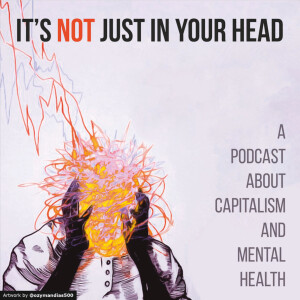
#024: Decommodify All Parts Of The Economy Related To Human Need
 2020-12-15
2020-12-15
Harriet proposes in this episode that for Americans to have good mental health, we have to decommodify all parts of the economy related to human need so that people don't feel depressed or anxious about things which all humans need and deserve. These aspects of the economy are primarily related to food, water, air, and housing. Currently, nutritious, organic and quality food is too inaccessible and expensive for millions of Americans. Privatized bottled water competes with public water so that when disasters like Flynt, Michigan occur, those who can afford bottled water for drinking and washing themselves, and those who can't may die. Air may not appear to be commodified, but areas where air is polluted (near fossil fuel extraction sites, for example) is cheaper to live near. The unequal distribution of access of food, water, and air across the U.S. shows patterns of inequality that sustain themselves as long as these aspects of commodified needs remain commodified (reinforcing our heavily racialized class divide in the U.S.).
Both therapists explore what decommodification of housing might look like. Max describes what authors of "In Defense Of Housing" call the hyper-commodification of housing since the Reagan Era, wherein random capitalists from all over the world can make financial decisions that can mass-evict tenants within cities because their housing is an "under performing asset." Max also tries to figure out if he and Harriet are advocating for social democracy (strong capitalist economy with heavy taxes to pay for social programs) or more traditional socialism (getting rid of the capitalist economy altogether). --
Support us at patreon.com/itsnotjustinyourhead
Contact us at itsnotjustinyourhead@gmail.com
Books referenced: In Defense Of Housing by Peter Marcuse and David Madden Capital City by Sam Stein
ATTENTION! This is a Boring Dystopia/Obligatory 'don't sue us' message: This podcast provides numerous different perspectives and criticisms of the mental health space, however, it should not be considered medical advice. Please consult your medical professional with regards to any health decisions or management.
More Episodes
 2022-05-18
2022-05-18
 2022-05-04
2022-05-04
 2022-03-30
2022-03-30
 2022-02-14
2022-02-14
 2022-01-31
2022-01-31
Create your
podcast in
minutes
- Full-featured podcast site
- Unlimited storage and bandwidth
- Comprehensive podcast stats
- Distribute to Apple Podcasts, Spotify, and more
- Make money with your podcast
It is Free
- Privacy Policy
- Cookie Policy
- Terms of Use
- Consent Preferences
- Copyright © 2015-2024 Podbean.com




